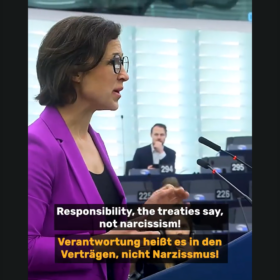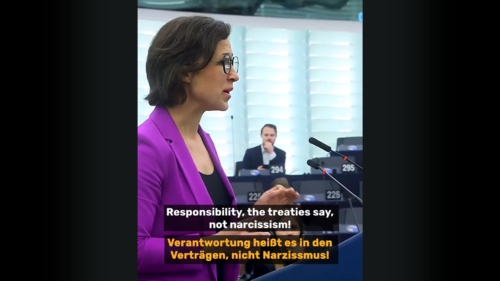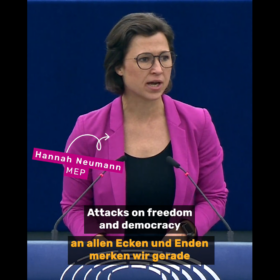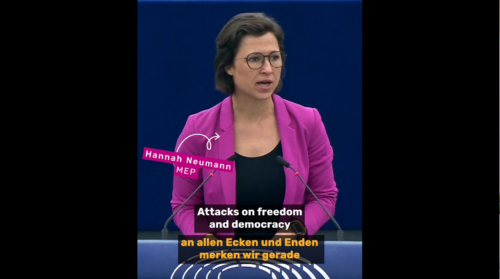Dear all, this is a report from my recent visit to the MENA region, including Egypt, Qatar and Iraq. From 26-29 October, I attended the Munich Security Conference (MSC) Core Group Meeting in Cairo and Doha where debates focussed on conflicts in the region, including, Syria, Yemen, Sudan, Libya and the Strait of Hormuz. Prior to the conference, I met with human rights activists in Egypt and subsequently, I visited Iraq from 30 October until 3 November.
Summary and conclusions
Just as I planned my visit, another round of protests sparked in the Middle East: Anti-government protests resurfaced in Algeria. Critical voices by Egypt’s youth against the government were suffocated in September in a fierce clampdown with thousands detained. In October, young people in Iraq and Lebanon took to the streets calling for political reforms and an end of corruption.
During my visit in Egypt and Iraq, I had the chance to speak to protestors, human rights defenders and civil society activists. Speaking for large parts of the population, the activists shared their key calls, including to participate effectively in political decision making, to speak freely about their visions for the country (including in social media) and to be able to demonstrate safely in the streets.
The discussion at the MSC differed. Here, the focus was on regional security infrastructure and the power balance between the different regional actors, namely Turkey, Egypt, Saudi Arabia and Iran. However, little attention was given to the domestic challenges these regimes are facing. Therefore, I have been strongly advocating at MSC debates to have a comprehensive security approach. Without listening to and addressing the needs of their people, governments in the region will fail to gain the legitimacy necessary to establish peace and security in the region.
My visit focused on the specific situation in Egypt after the crackdown on demonstrations, the protests in Iraq that have led to more than 300 deaths since early October, the challenges Iraq continues to face despite the defeat of the Islamic State and the situation at the Syrian/Iraqi boarder after the invasion of Turkey in Northern Syria. A brief summary of my key conclusions are the following:
- Calls our group made in connection with the recent resolutions on human rights violations in Egypt and Turkey’s invasion in Syria remain highly relevant.
- A debate (with resolution) on Iraq at the forthcoming Strasbourg session would have been very timely and could have included the following key calls – disappointingly our call for such a resolution did not find a majority:
- pressuring Iraqi authorities to stop immediately lethal violence against demonstrators and to have independent investigations.
- agreeing on an EU export ban on arms and other equipment to Iraq to be used for repression of protesters.
- making it a priority for the EU Advisory Mission to ensure that the Iraqi security forces will refrain from excessive use of force when faced with legitimate protest and adapt the consecutive mandate of the mission to include the aspect crowd control based based on international standards.
- for the EU to facilitate dialogue and mediate vis-a-vis the current crisis as well as to other unresolved conflicts in Iraq.
Egypt

I arrived in Cairo on 24 October in the evening, the day the European Parliament had adopted a strongly worded urgency resolution critical of the human rights situation in Egypt (of which I was the rapporteur). The resolution condemns Egypt’s crackdown against protesters and calls for an export ban on surveillance and repression equipment, for human rights benchmarks for future EU-cooperation and for the option to impose targeted measures.
The Egyptian authorities were clearly upset about our urgency resolution. The next day, the Egyptian Parliament issued a counter-resolution refusing “unacceptable” European interference into internal matters. At the MSC meeting, Egyptian authorities sent another message of protest to Europe: Whilst fellow German MPs were all invited to a dinner with Egyptian President al-Sisi, I as a MEP was excluded. Discussions at MSC focused on the situation in Sudan, the African perspective on the Syrian crisis and the possible role Egypt could play in a regional security infrastructure.
However, before the MSC conference started in the evening of the 26th, I had arranged meetings with civil society representatives, including relatives of political prisoners as well as human rights and women’s rights activists. Until today, more than 4.000 protestors have been detained, many of them for offences such as using messenger services or liking posts of the protests on facebook. Most of them cannot receive visitors, rarely get enough food or clothing and have their hearings delayed. Human rights organisations are very worried that this may lead to radicalisation of the youth.
The EU delegation tries to support civil society organisations, including human rights organisation, wherever possible. The EIDHR proofs to be a very successful tool towards this end as it allows for flexible support without prior consultation with the regime. Those working on human rights underlined that they would hope the instrument could be strengthened in the next MFF.

The meetings with CSOs took place in a typical police state atmosphere: Although we had arranged the meetings via safe messenger communication, we assumed being under surveillance. Not surprisingly, a number of activists I had contacted for meetings had to decline, due to fear of reprisals. They strongly welcomed the critical position of the European Parliament as it increases pressure on the regime and confirmed that high-profile arrests had stopped afterwards. The suppression was visible all over Cairo: Security agents manned the main streets and tanks were surrounding Tahrir Square.
Qatar and conflicts in the Gulf
Whilst Saudi Arabia was present in Cairo, the Qatar leg of the MSC was an opportunity to listen also to the other side. Accordingly, the Iranian Foreign Minister, Mohammad Javad Zarif, had the floor to present his view on regional conflicts, including in Yemen and the Strait of Hormuz.
As panellist, I was debating the crisis in the Gulf with Nechirvan Barzani, President of the Kurdistan Regional Government, ministerial representatives from the region and regional experts. However, most of my co-panellists focussed entirely on regional and international players as key actors for regional security and stability without addressing the ongoing street protests. When I stated that the MENA region was experiencing a second Arab Spring that should be met with offers for participation rather than violence, such reference provoked strong objections from government officials coming from the respective countries.
Besides the formal settings, the MSC meeting was an excellent opportunity for side meetings where I was very pleased to sit and talk to Nobel Prize laureate and Yemeni human rights activist, Tawakkol Karman, among others.
Iraq and the protests
A day before I arrived in Iraq, the Lebanese Prime Minster, Saad Hariri, had resigned following weeks of protests. While people in Lebanon were celebrating in the streets, Iraqi security forces continued to kill people in the streets of Baghdad and elsewhere. Over the past month, more than 300 of the largely peaceful protesters have been killed.

During my stay in Iraq, I spoke with many young people from the areas of protest – namely the Shiite South and Baghdad – and from the Kurdish North and Arab Sunni West where it has remained largely quiet. I spoke with those who had already participated in the protests and those who told me they would join the protests in the next days.
Despite the high blood loss, young people are enthusiastic, optimistic and ready to continue the protests. They are connected through the internet and opposed to regional and sectarian divisions. However, authorities frequently disrupt the internet access, in order to hinder communication between protesters and restrict reporting.
Protesters call for fundamental reforms of the political system and culture. They demand the government to step down and an end of corruption. They demand freedom and human rights and call for those responsible for the killing of protesters to be brought to justice. Many are also asking what the international community is doing in support of their calls.
Young people want to overcome the divisions between the different ethnic and religious groups in Iraq. This is why they are shouting on Tahrir Square in Baghdad and elsewhere: “We are all Iraqis”.
Calls of Iraq’s protesters for political reforms must not go unheeded and deserve Europe’s support. It is high time that Europe acts swiftly, in order to prevent further escalation in Iraq.
Two years after defeating the Islamic State
It is more than two years since the terror regime of the Islamic State was defeated in Iraq. Yet, its legacy is still a huge burden for those living in the region. Return and reconciliation proof extremely hard and there is no long-term vision for dealing with the tens of thousands detained Islamic State fighters in Iraq and in Syria, only a small minority with European nationality. As for the latter group, the EU member states should act jointly and in a coordinated manner to return European nationals suspected of Islamic State membership to Europe, in order to bring them to trial according to international standards.

Astriking example for the challenges was my visit to Mosul. The centre of this once beautiful city still looks like a battleground. Thousands of buildings, mainly residential homes, were destroyed in airstrikes. Other parts of the city were less affected and almost normal live has returned. Whilst many of Mosul’s inhabitants have returned, many others are still living in camps unable to return. There were two recent waves of displacement: in 2014 hundreds of thousands fled the Islamic State and in 2017 again people fled during the fighting for the liberation.
I saw several camps for thousands of internally displaced persons (IDP) living in tents close to the Northern town of Zakho in the Kurdish Region of Iraq. At Camp Bersive 1 where mainly Yazidis from the Sinjar district live, I was told that for Yazidis it was still impossible to return to their homes due to the lack of security and infrastructure.
At the Salamiya IDP Camp in the Nineva Plains, I spoke to inhabitants who were stigmatised for having family members who – de facto or allegedly – were affiliated with the Islamic State. They were concerned by the announced decision of the governor of the Mosul/Nineva province to close this and most other IDP camps by the end of the year. It remains unclear where those who cannot return to their homes will go. Further, there seems to be a serious lack of accompanying measures for those returning, in particular where there is obvious need of reconciliation between those who lived under Islamic State control and those who fled.
Impact of the Syria crisis
The Syrian conflict has forced more than 200.000 Syrians to seek refuge in Iraq. Turkey’s recent invasion in Northern Syria caused another 10.000 people to flee. Therefore I decided to visit an the Northern border checkpoint of al-Waleed between Iraq and Syria where recently most Syrian refugees have crossed and where Peshmerga and the Barzhani foundation deal with the registration and distribution of arrivals. The number of incoming refugees was less than expected (about 200/night at that check-point) as Kurdish forces on the Syrian side of the border blocked most refugees from crossing. Concerned about the demographic impact of a possible exodus they would prefer to set up camps on Syrian territory.

ECHO and other aid organisations set up structures for cross-boarder support for IDPs inside Syria. Their situation was dramatic at the time of my stay. Many had previously lived a rather normal life due to the relatively stable situation in the Kurdish dominated areas of Northern Syria. When Turkey started its invasion they had to leave at very short notice. This left especially children in a state of shock and trauma. Kurdish refugees who tried to return to their village when the violence decreased were systematically rejected at check-points manned by Turkish forces or affiliated militias implementing a policy of cleansing the area of its Kurdish inhabitants. A situation is unlikely to change in the near future. Besides speaking to refugees and family members of Kurds stuck on the Syrian side, I also spoke to a journalist who had just returned from Syria. She told me that the proposal of the German Defence Minister, Annegret Kramp-Karrenbauer, to deploy European troops in Northern Syria, had led to very short-lived hopes among Kurdish forces “that the Germans are now coming to save us” after they had been abandoned by the US.
The EU is a major aid donor in the region, including in the areas of humanitarian aid, stabilisation, reconstruction, human rights, migration, security and the political and economic reform. However, vis-a-vis ongoing conflicts and crisis in the region, the EU has hardly become a decisive political actor. Rather than working on concrete actions as outlined in the EP resolution on the Turkish invasion, for example, most energy went into discussing short-lived proposals as that of AKK. The EU must overcome its role as a bystander, including by making effective use of its soft skills as mediator in conflicts and supporter of political reform in the region.












